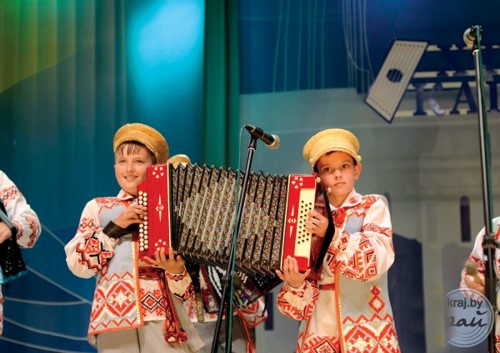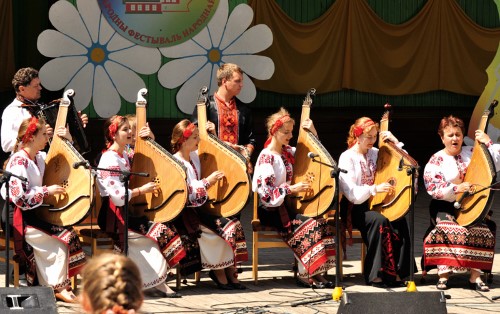
A hundred guests from Poland, Ukraine, Russia, Lithuania, Latvia and Estonia joined a dozen Belarusian groups for the wonderful celebration of folk music, hosted by the Postavy District. In fact, the town of Postavy has been gathering musicians for 25 years, reviving forgotten traditions, developing authentic art and preserving our musical cultural heritage. Even Vitebsk’s Slavianski Bazaar has only been organised for 24 years. Despite borders and distances, all speak a common language: that of folk music.
The folk festival originally began in Vitebsk, later moving to Mogilev, and then to Postavy in 1992, notes the Chairman of the Postavy District Executive Committee, Victor Gutorov. He underlines, “Our district is perhaps the only place in the country where the diatonic cembalo continues to be played. We have a foundation team teaching the instrument, to preserve the rich musical traditions of the past. The Postavy District is home to such unique groups as Gruzdauskiya Muzyki and Paazerie, which enrich our land’s cultural life.”
Tatiana Syrovezhkina, who heads ArtGame-Quintet, at the Gomel District’s Uritskoe children’s school of arts, began learning the cembalo at the age of 7, and has been dedicated ever since. She tells us, “Since childhood, I’ve been enchanted by the sound of the cembalo, which helps me to relax when I’m not at work. We established ArtGame-Quintet in 2010, and immediately decided to arrange classical and modern compositions for folk instruments, bringing together international and national art.”

Festival in Postavy attracts increasing numbers of new bands each year
Alexey Androsik, who heads Nesvizh District’s Anoshkayskiya Muzyki band (having first joined as a member), plays the accordion. However, for the festival, he took up the Belarusian harmonica. He comments, “After graduating from Minsk’s College of Arts, I returned to my native school, where we have a harmonica group. I began learning and can now play every instrument within our group: the pipe, sopilka, zhaleika and basetlya. I’m gradually sharing my knowledge with the younger generation.”
Among Mr. Androsik’s pupils is musical genius Artem Derevyago, aged 15. At the age of 6, he joined the children’s school of Arts. He failed to fall in love with the first instrument presented to him, the button accordion, but found his soul-mate in the harmonica. He mastered it quickly, then joined Anoshkayskiya Muzyki band. Artem is keen to continue on a musical path, wanting to study at Baranovichi’s Musical College and then become a teacher. “If all goes well, I’ll become an artiste,” he muses.
Postavy residents adore their festival and love to welcome guests, being proud of their wonderful concert forum. People’s Artiste Mikhail Kosinets, who heads the jury, notes that it’s no easy task gathering several thousand people, and more come each year. He explains, “Folk music will remain alive as long as our human soul exists. Looking back 25 years ago, we were planning our revival of forgotten traditions. We no longer need to worry that our traditions will be lost, having welcomed performances from over 1,500 masters of folk music and poetry. I’m convinced that all is well while such bands exist as Minsk’s Dudaryki, which won the 2015 Grand Prix. Our talented younger won’t allow these traditions to remain in the past.”
By Yuliana Leonovich











